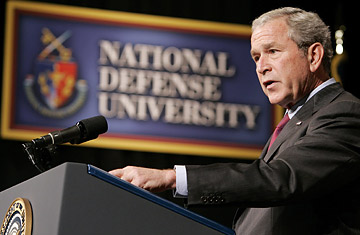
President George W. Bush speaks about U.S. troop strengths in Iraq while addressing the National Defense University at Fort Lesley J. McNair in Washington on Sept. 9
The Bush Administration seems to have taken to heart Barack Obama's assertion that the U.S. should be as careful getting out of Iraq as it was careless going in. President Bush announced today that he'll withdraw only about 5% of the current 146,000-strong force in Iraq before he leaves office. "Civilian deaths are down, sectarian killings are down, suicide bombings are down and normal life is returning to communities across the country," Bush told a military audience in Washington this morning. "While the enemy in Iraq is still dangerous, we have seized the offensive."
But the redeployment is decidedly modest, scaled way back from the drawdown hoped for by some military officials (over the past year, they have suggested that one-third of the current U.S. force could be withdrawn by 2009). Bush plans to withdraw 8,000 troops around the time he leaves office on Jan. 20, leaving about 137,000 in Iraq for the next President to deal with. Barack Obama, the Democratic nominee, has declared that he would withdraw all U.S. combat forces within 16 months of taking office; GOP nominee John McCain has said only that his withdrawal plans would be guided by U.S. commanders in Iraq. (See photos of five years in Iraq here.)
The President's announcement is an endorsement of recommendations by his chief commander in Iraq, General David Petraeus, and it means two things: first, that the war in Iraq isn't going as swimmingly as the public believes; but second, that things in Afghanistan may not be as dire as commonly believed. After all, in the coming days Petraeus will take over as head of U.S. Central Command, which would make him responsible for the U.S. military in both countries — and given the limited number of troops available, he knows that any reinforcements sent to Afghanistan would mean pulling troops out of Iraq. Petraeus evidently "doesn't think it's worth taking any more risks in Iraq to be able to shift more force to Afghanistan," said John Nagl, a retired Army lieutenant colonel and former Petraeus adviser. A resurgent Taliban in Afghanistan has led both presidential candidates to call for sending more U.S. troops there.
U.S. officials say the relative peace in Iraq — attacks by insurgents have fallen 80% since last year — remains fragile. A lack of progress in resolving the country's political divisions could trigger more violence, especially if large U.S. units pull out, Pentagon officials say. When the British pulled out of the southern city of Basra in 2007, the resulting vacuum was filled by Shi'ite militia units until the Iraqi government sent in its improving army in March and brought the city under Baghdad's control. And Bush doesn't want to begin a major withdrawal that could jeopardize recent security gains as his successor takes office.
"This war in Iraq is not over yet," Nagl said. "There's been a little bit of a dance-in-the-end-zone phenomenon that concerns me." Nagl, who returned from Iraq last month, says there is "still a running gun battle with al-Qaeda in Iraq" in the northern part of the country around Mosul. U.S. troops there are "still in the 'clear' phase of 'clear, hold, build' counterinsurgency strategy," said Nagl, a West Point graduate and author of Learning to Eat Soup with a Knife: Counterinsurgency Lessons from Malaya and Vietnam who recently helped Petraeus rewrite the Army/Marine Corps' Counterinsurgency Field Manual. "There's still a fight going on up north, and we're going to have a fight there for awhile."
Nagl noted that, traditionally, commanders want as many troops as they can get, and that General Petraeus would be expected to "slow-roll the withdrawal" if he were to remain in charge of Iraq only. "But given that he knows that he is going to assume responsibility for Afghanistan as well, it indicates the gains in Iraq really are fragile and this is probably a prudent decision." But Nagl, now with the Center for a New American Security in Washington, is still puzzled by the decision. "I would not say we are winning the war in Afghanistan, so we're in a tough position," he said. "Frankly, I'm a little surprised — I thought we were going to draw down a little faster than we're going to." (View a brief history of the Iraq war here.)
